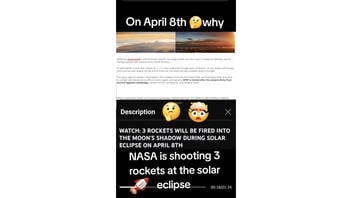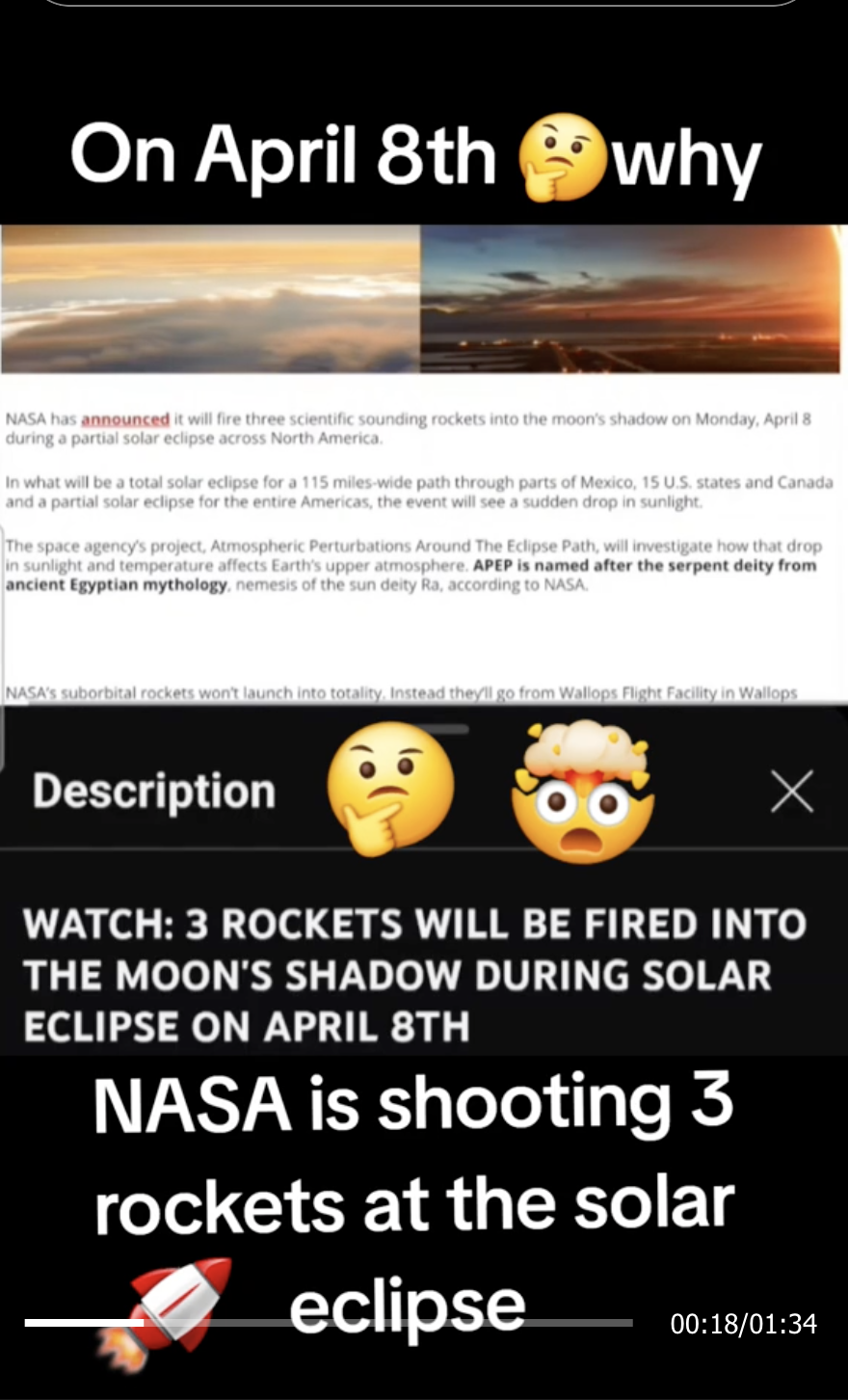
Is NASA launching three rockets during the solar eclipse on April 8, 2024, for nefarious or "strange" purposes, as a post on TikTok implied? No, that's not true: While NASA is indeed launching the rockets before, during and after the solar eclipse, the purpose is to study disturbances in the ionosphere -- an electrified region of the atmosphere. The disturbances occur when the moon eclipses the sun. The research is conducted to understand better how solar eclipses may impact communication systems. There is no evidence to corroborate suggestions that the 2024 launches are mysterious, or nefarious, as the video on TikTok implies.
The claim appeared in a video on TikTok on March 27, 2024 (archive), in which a narrator said, "It says here, 'NASA program named after "Serpent Deity" plans to fire several rockets at the upcoming solar eclipse." A caption that accompanied the post read:
#rocket #nasa #solarflare #solareclipse #eclipse #purge #emergencyalert #alert #warning #nationalguard #national #worldwide #march #marchmadness #2024 #april #CapCut #solareclipse #eclipse #april8 #april8th #lightsout #blackout #march #marchmadness #purge #unitedstatesofamerica #us #unitedstates #usa #ENDGAME #trending #wtf #crazy #alert #warning #fyp #foryoupageofficiall #explorepage #fypdongggggggg #fypage #fypシ #fypシ゚viral #viral #trendingnow #fyp #lilwatteazy #breakingnews #breaking #news #today #hoodnews #realnews
Below is how the post appeared at the time of writing:
(Source: TikTok screenshot taken Sat March 30 13:01:00 UTC 2023)
The video on TikTok opens with a screenshot of an article (archived here) titled, "NASA program named after 'Serpent Deity' plans to fire several rockets at the upcoming solar eclipse," which are the words the narrator uses to begin the video. Lead Stories conducted a Google search (archived here) of the title. We determined that it was published on March 26, 2024, by End Time Headlines, which is described on its "About" page (archived here) as being founded with "the intent to be a 'once source' location for those wanting to be informed of happenings around the globe in light of the End Times from a 'Biblical Perspective'."
At the 14-second mark in the video on TikTok, a screenshot of the article published by The End Times was shown. It read:
NASA has announced it will fire three scientific sounding rockets into the moon's shadow on Monday, April 8 during a partial solar eclipse across North America.
In what will be a total solar eclipse for a 115 miles-wide path through parts of Mexico, 15 U.S. states and Canada and a partial solar eclipse for the entire Americas, the event will see a sudden drop in sunlight.
The space agency's project, Atmospheric Perturbations Around The Eclipse Path, will investigate how that drop in sunlight and temperature affects Earth's upper atmosphere. APEP is named after the serpent deity from ancient Egyptian mythology, nemesis of the sun deity Ra, according to NASA.
NASA announced (archived here) on March 25, 2024, that it would "launch three sounding rockets during the total solar eclipse on April 8, 2024, to study how Earth's upper atmosphere is affected when sunlight momentarily dims over a portion of the planet." Called the Atmospheric Perturbations around Eclipse Path (APEP), the rockets study ionosphere disturbances created when the moon eclipses the sun.
According to NASA (archived here), the APEP acronym shares its name with a serpent deity from ancient Egyptian mythology who was the nemesis of the Sun deity Ra. Apep was said to pursue Ra "and every so often nearly consumed him, resulting in an eclipse."
According to the space agency, the rockets will be launched at three different times, 45 minutes before, during and after peak local eclipse from where they are launched at NASA's Wallops Flight Facility (archived here) in Virginia.
The ionosphere is a boundary between Earth's lower atmosphere, where we are, and an altitude between 55 and 310 miles high. Here, particles become ionized, or electrically charged, by the sun's energy, also known as solar radiation. At night, charged particles neutralize over time.
Aroh Barjatya (archived here), a professor of engineering physics at Embry-Riddle Aeronautical University in Florida and director of the Space and Atmospheric Instrumentation Lab, described this region in a press release as an "electrified region that reflects and refracts radio signals, and also impacts satellite communications as the signals pass through."
Understanding how the ionosphere is disturbed during solar events, such as an eclipse, helps researchers predict disturbances and study how they may one day impact communications systems. Typically only spending between five and 20 minutes in space, sounding rockets (archived here) like those that will be used during the APEP launch, eject instruments to collect data on particles, their density and surrounding electric and magnetic fields. NASA writes:
It's often difficult to study short-term changes in the ionosphere during an eclipse with satellites because they may not be at the right place or time to cross the eclipse path. Since the exact date and times of the total solar eclipse are known, NASA can launch targeted sounding rockets to study the effects of the eclipse at the right time and at all altitudes of the ionosphere.
As the eclipse shadow races through the atmosphere, it creates a rapid, localized sunset that triggers large-scale atmospheric waves and small-scale disturbances, or perturbations. These perturbations affect different radio communication frequencies. Gathering the data on these perturbations will help scientists validate and improve current models that help predict potential disturbances to our communications, especially high frequency communication.
The rockets were previously launched during the October 2023 annular solar eclipse (archived here), when researchers found a sharp reduction in the density of charged particles as the eclipse shadow passed the atmosphere.
NASA writes that the APEP launches will be livestreamed and included in the agency's official broadcast (archived here) of the total solar eclipse.


















